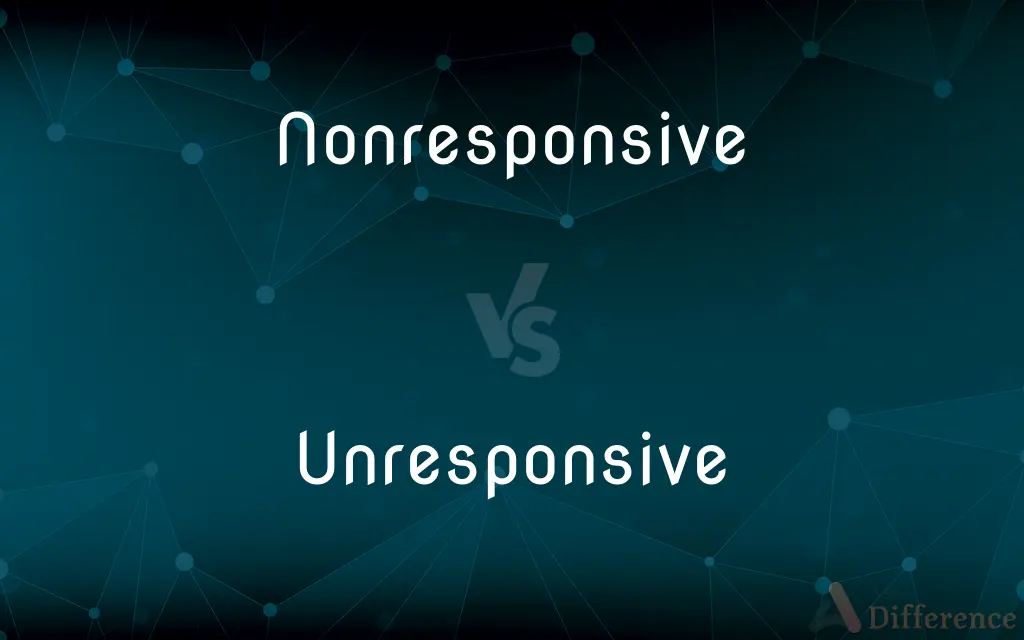Nonresponsive vs. Unresponsive — What's the Difference?
By Tayyaba Rehman & Fiza Rafique — Updated on September 12, 2023
"Nonresponsive" typically refers to not reacting in a desired or expected way, often used in formal or legal contexts. "Unresponsive" generally indicates a lack of reaction or responsiveness, often implying a problematic or concerning state.

Difference Between Nonresponsive and Unresponsive
Table of Contents
ADVERTISEMENT
Key Differences
"Nonresponsive" is an adjective that often appears in formal or legal settings to describe someone or something that is not reacting as desired or expected. For example, during a deposition, a witness might give a "nonresponsive" answer, meaning it does not adequately address the question asked. "Unresponsive," on the other hand, is a broader term that can be used to describe a lack of reaction in both formal and casual settings, often conveying a more serious or concerning implication, like "The patient is unresponsive."
Both "nonresponsive" and "unresponsive" can describe people, devices, or systems. "Nonresponsive" tends to be used more selectively and implies that the non-reaction is specific to a context or set of expectations. For example, a "nonresponsive" website might be one that doesn't function as intended on mobile devices. "Unresponsive" is more universally understood to mean not working, regardless of context, like "My computer is unresponsive."
In terms of usage, "nonresponsive" can sometimes appear to be less severe than "unresponsive," owing to its more formal and context-specific connotation. If someone is labeled "nonresponsive" in a meeting, it may mean they are not participating as expected, but it doesn't necessarily imply a critical condition. When describing someone as "unresponsive," however, it often raises immediate concern, implying a medical emergency or a severe malfunction in devices.
"Nonresponsive" often goes hand-in-hand with qualifiers or additional information to explain the context in which the nonresponsiveness occurs. "Unresponsive" usually stands alone, with its severity understood implicitly. In summary, while both words share similarities in denoting a lack of reaction, they differ in the range of their usage and the severity they typically imply.
Comparison Chart
Connotation
Formal, often less severe
General, often more severe
ADVERTISEMENT
Context
Specific contexts (e.g., legal, technical)
Broad contexts (e.g., medical, everyday usage)
Severity
May or may not imply severity
Often implies severity
Qualifiers
Often used with qualifiers
Usually stands alone
Example Usage
"The website is nonresponsive on mobile."
"The patient is unresponsive."
Compare with Definitions
Nonresponsive
Not reacting as expected in a specific situation.
The software was nonresponsive to the new update.
Unresponsive
Lacking any reaction.
He remained unresponsive despite multiple attempts to revive him.
Nonresponsive
Not giving the expected answer or reaction.
The witness was nonresponsive during the questioning.
Unresponsive
Not adaptable or flexible.
The rigid material is unresponsive to changes in temperature.
Nonresponsive
Lacking adaptability to particular requirements.
The system is nonresponsive to the new settings.
Unresponsive
Indifferent or unconcerned.
The company was unresponsive to customer complaints.
Nonresponsive
Not meeting the expectations in a formal setting.
The employee was nonresponsive to the training.
Unresponsive
Showing no emotional or physical reaction.
She was unresponsive to the news.
Nonresponsive
Not interactive in a given context.
The user interface is nonresponsive.
Unresponsive
Not working or functioning.
The machine is unresponsive.
Nonresponsive
Not responsive.
Unresponsive
Not responsive
These symptoms may be unresponsive to conventional treatment
Unresponsive
Exhibiting a lack of responsiveness.
Unresponsive
Not responsive; unreactive.
Unresponsive
Indifferent or apathetic; emotionless.
Unresponsive
Not responsive
Unresponsive
Aloof or indifferent;
Was unresponsive to her passionate advances
Unresponsive
Not susceptible to suggestion or influence
Unresponsive
Not responsive;
A government unresponsive to their demands
Unresponsive
Not tending to react to stimulation
Common Curiosities
Can Nonresponsive imply severity?
It may, depending on the context, but generally, it's seen as less severe than "unresponsive."
What does Nonresponsive mean?
Nonresponsive refers to a lack of reaction specific to a context or expectation, often in formal or legal settings.
Is Unresponsive always severe?
While not always, "unresponsive" usually implies a higher level of concern or severity.
Is Nonresponsive more formal?
Yes, "nonresponsive" often appears in more formal or technical contexts.
Is Unresponsive used in formal writing?
Yes, "unresponsive" can be used in both formal and informal contexts.
Can Nonresponsive mean unwilling?
In some contexts, yes. For instance, a "nonresponsive" person in a meeting may be seen as unwilling to participate.
Is Nonresponsive always used with qualifiers?
Often, but not always. It can sometimes stand alone.
Can Unresponsive be used in technical settings?
Yes, "unresponsive" can be used to describe non-functioning systems, software, or machinery.
What does Unresponsive mean?
Unresponsive indicates a general lack of reaction, often implying a concerning or severe state.
Do Nonresponsive and Unresponsive have similar origins?
Both words are constructed with prefixes ("non-" and "un-") attached to the base word "responsive."
Is Nonresponsive used in medical terms?
It can be, but "unresponsive" is more commonly used to describe a critical medical condition.
Can Unresponsive be used in legal contexts?
Yes, but "nonresponsive" is more common for specifying inadequate or inappropriate responses.
Can Nonresponsive be used in everyday language?
While it can be, it is less commonly used than "unresponsive" in everyday settings.
Does Unresponsive imply neglect?
It could, especially in contexts like customer service where an "unresponsive" company may be seen as neglecting its customers.
Do both words have similar antonyms?
Yes, "responsive" can serve as an antonym for both "nonresponsive" and "unresponsive."
Share Your Discovery

Previous Comparison
Crutch vs. Clutch
Next Comparison
Enabled vs. DisabledAuthor Spotlight
Written by
Tayyaba RehmanTayyaba Rehman is a distinguished writer, currently serving as a primary contributor to askdifference.com. As a researcher in semantics and etymology, Tayyaba's passion for the complexity of languages and their distinctions has found a perfect home on the platform. Tayyaba delves into the intricacies of language, distinguishing between commonly confused words and phrases, thereby providing clarity for readers worldwide.
Co-written by
Fiza RafiqueFiza Rafique is a skilled content writer at AskDifference.com, where she meticulously refines and enhances written pieces. Drawing from her vast editorial expertise, Fiza ensures clarity, accuracy, and precision in every article. Passionate about language, she continually seeks to elevate the quality of content for readers worldwide.














































